Articles about reggae music, reviews, interviews, reports and more...
Interview: Larry McDonald
- Home
- Articles
- Interviews
- Interview: Larry McDonald

Interview: Larry McDonald
"I just wanted to be the conga player"
Sampler
Larry McDonald is one of the most accomplished percussionists in the world. Honored in Jamaica in 2011 with a lifetime achievement award, for over fifty years McDonald has recorded and toured with pioneering performers, such as the late jazz and spoken-word musician Gil Scott-Heron (who described himself as a "bluesologist"), blues artist Taj Mahal, and a litany of legendary reggae stars, including Toots & The Maytals, Lee "Scratch" Perry, and all of the original Wailers — Bob Marley, Peter Tosh, and Bunny Wailer — collectively and individually.
Despite turning 80 in June, McDonald's passion for hand-drumming, particularly conga-playing, hasn't slowed a beat. He's still creating and playing new music, and currently, he's touring with fellow octogenarian Perry (who is 81). Together with New York City's Subatomic Sound System, the pair are promoting Perry's new dub album, "Super Ape Returns to Conquer," a magnificently modernized and mind-blowing remake of Perry's iconic 1976 "Super Ape" album.
On November 2, I was lucky to interview Larry McDonald after he and Perry played to a capacity crowd at Los Angeles' popular Dub Club. The interview took place onstage with McDonald's congas serving as a table for my notes and audio recorder. The topics we discussed included: his experience working on "Super Ape Returns to Conquer" as compared to 41-years ago when McDonald performed on Perry's classic Super Ape album; recording his only solo album – the critically acclaimed "Drumquestra" – in Jamaica; difficulties faced by hand drummers; the influence of Jamaican conga drummer Noel Seale; McDonald's new music projects (in addition to touring with Perry); and finally, McDonald's thoughts on the breakup of the original Wailers and his special memories of Bob Marley and Peter Tosh. What follows is a transcription of the interview modified only slightly for clarity and space considerations.
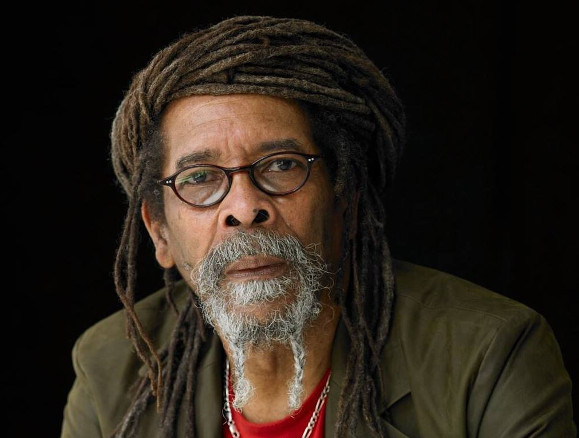
Six years ago, in 2011, when you received a lifetime achievement award at the "Tribute to The Greats" in Jamaica, did you have any inkling you'd be touring with Scratch once again, behind a brand new "Super Ape" album?
Well, actually we've been doing this [performing with Lee Scratch Perry and Subatomic Sound System] for the past seven years.
That was a big deal when you won that lifetime achievement award?
It was to me, you know? (Laughing) Any award a conga drummer gets is a big deal, man. Because we don't get awards.
You played on the original Super Ape Album with Scratch in '76. How did working on this new Super Ape album compare with that original experience over 41 years ago? What's different? And what's the same about it?
Well, what's the same about it is: Scratch still has those crazy outside ideas that he's always had. What's different about it: now, I'm able to play the shit that I wanted to play forty years ago and never got the chance. (Laughing) Now, I'm getting the chance.
Scratch has a deeper trust in you? Let's you do what you want now?
I guess I've earned my stripes. (Laughing)
I guess so, after fifty years. Now, in just about every article that has been written about Lee Scratch Perry, although everyone acknowledges his musical genius – and his contributions to reggae and dub music, and to all of music – there has also been a heavy focus on what folks call his "eccentricities." Some unabashedly conclude Mr. Perry is really "crazy." As his friend, does this bother you at all?
No. It doesn't bother me. Because I'm in the business. And I know that once people get an impression of you, it's the hardest thing to change. Once the public sees you like this. But I think he's eccentric. I don't think he's crazy.
Since you know Lee Scratch Perry so well, is there anything about him that you wish the world knew about him – that folks don't know about him? About his personality? Or the way he is?
I wish that when people meet him, right... they wouldn't right away think that he's crazy. Just meet the guy and talk with him, and see if he's crazy. Because he makes a lot of sense, you know? He makes a lot of sense. And a lot of the shit he says goes over people's heads. Plus, the heavy Jamaican accent. People have to fight their way through that. And they come through that with a different interpretation, you know? 'Cause what the words he says means to them in the context of "Jamaican-ese," it [actually] means something different. Say for instance: it's a very popular term now for people to say "skin up" when they are rolling a joint, right? But the term "skin up" comes from a [Jamaican] saying that "not every skinned teeth is a laugh." In other words, not every time you show your teeth, it's a laugh. To skin your teeth is to show your teeth. So somebody says to you, "no skin up," that means, "I'm not joking with you." (Laughing)
People don't spend enough time trying to comprehend Scratch as they should?
Yeah. Because they come with this [preconceived] idea – they expect him to say something "crazy" or outlandish. Forget the thick Jamaican accent. If you listen to him, you'll understand what he says.
Now, I want to ask you a few questions about yourself.
Uh-oh.
Many people saw your album Drumquestra as a crowning achievement for you on a 50-year career in music. And I wondered do you think Drumquestra was your magnum opus? Was that your most important work to leave behind?
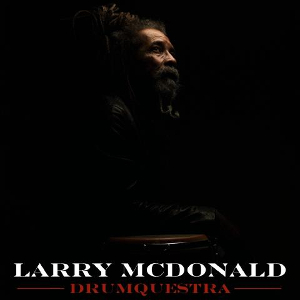 I think that what happened with that record, I finally got a chance to... Remember, I'm telling you, conga players don't get these types of things? Ok. So I got a chance to do this. And I said, "I'll do it for that money, if I can get to do the album I wanted to do."
I think that what happened with that record, I finally got a chance to... Remember, I'm telling you, conga players don't get these types of things? Ok. So I got a chance to do this. And I said, "I'll do it for that money, if I can get to do the album I wanted to do."
And you did it?
And they agreed to that. And, yeah, I pretty much did it.
I understand you even recorded inside of the caves [in Jamaica]?
Oh yeah. We went inside the Runaway Caves. That's the one thing I didn't give away. Anything else musically, you know, I put it on somebody else's record. But the knowledge about those rocks in the caves that sound like a gong... I said, if I ever do a record, I'm going to put that shit on there.
You saved that for yourself?
I did. (Laughing) I mean, by this time, it's all protected and you have to get all kinds of government permission. And we did that. I played the fucking rocks, man!
It sounds, awesome. Because, as you say, drummers don't get enough respect.
Conga drummers. Not drummers. Hand drummers.
You're making a distinction then?
Trap drummers always got a gig, man. (Laughing) Trap drummers – look, I was in Dallas [Texas] three nights ago. And, this bass player opened for us. He had played in front of us already. And we were talking, and I said, "man, that was a kick ass set!" And he said, "I used to be a percussionist man. But I got tired of being the last person called, of being the first person fired, of being the last person to get paid, getting the least pay of everybody else." He said, "I couldn't deal with it." I guess I'm just perverse. (Laughing)
You have just hung in there and taken the punishment for all this time?
You know? (Laughing)
You've spoken in other interviews about how Bahamian drummer "Big Black" was one of your biggest influences.
Yeah.
Is there were any drummers, percussionists from Jamaica, who also influenced your career, or somehow helped you along the way?
One of the greatest conga soloists I've seen was a Jamaican drummer named Noel Seale. When I was growing up, I wanted to be Noel. Badass player! He's a true example of the fact that hand drummers don't really –
Get respect?
Look, what I did: I was stubborn. And, what is it, "nevertheless, he persisted." (Laughing) That's what I did. I persisted. Because, that's what I wanted to play, Ok? That's the instrument I wanted to play. And I didn't feel that I should be driven off of it by anybody – just in the interests of surviving. I decided that I wanted to do it to a level that I could get paid some kind of how.
Awesome. And you stood firm. Stuck with it.
Yeah. And, I didn't make no money. I made a living. (Laughing) But also, I ended up doing exactly what I wanted to do. I just wanted to be the conga player around here. That's all I ever wanted to be, man, you know? (Laughing)
And it worked out. Now I know you've lived in the United States since the '70s I believe?
'73.
But when I watched you do interviews about Drumquestra in Berlin, and you spoke about Jamaica, there was such a love that came out because you spoke about how surprised and humbled you were by the fact that Jamaicans knew you were recording this album and actually came out to support you. And when you spoke about that – and you also spoke about having recorded part of the album in the caves – I heard such a love of Jamaica in your voice. And so, because the political climate is the way it is now in this country, I wondered whether you could ever see yourself returning permanently to Jamaica? Or is the U.S. now your home?
I'd love to go back to Jamaica. To live. Permanently. But my situation at the moment can't stand it. And my support group so to speak is in New York. After you live there a certain amount of time.
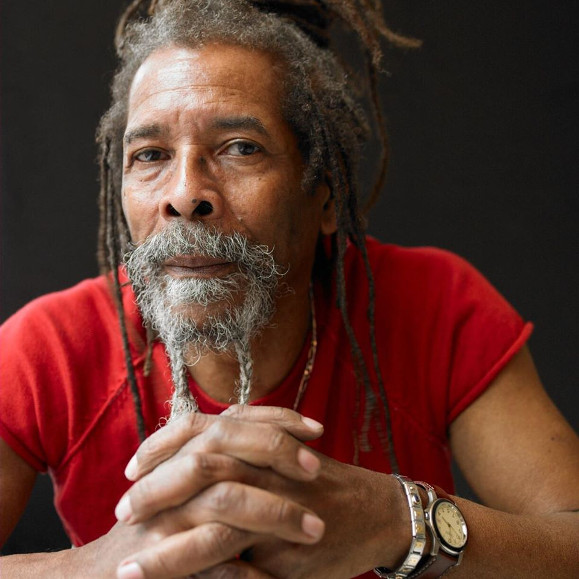
And you play with a number of bands there in New York?
Yeah. One of my favorite new projects that I'm working with is the New York City Ska Orchestra. That's an 18-piece big band. And I get a chance to play with that.
In addition to doing that, and touring with Scratch, are there any other new music projects you're considering?
Honestly, I'm thinking about doing another album. Give my take on some of the new music that is being produced today. You know?
You've spoken movingly about how, when you were growing up, if you had told your parents initially that you wanted to be a musician that they would have said you were crazy. And so, the way you first left your home in the countryside, in Port Maria, was that you said you were going to visit some family members in Kingston. And then, it wasn't until two and half years later that your family saw you again – passing through while playing in a band!
(Laughing)
When I heard you tell that story it made me want to ask whether your parents lived long enough to see your success — as a conga drummer?
My parents didn't. But, my stepfather, he was Inspector of Police. And he retired. And he was partners in a couple of bars with his buddies. So I was passing one of the bars one day and he was there. And he saw me, and he says, "come here man." I went in. And he introduced me to his boys. He said, "this is the son – ," I was never "the stepson," I was always his "son." [He said,] "This is my son who you always hear me talk about, but you never see because he's always off doing something. So, we had a drink. And everyone wanted to buy me, the youngster, a drink. (Laughing) And halfway through, [my stepfather] put his arm around me and he said, "come here." And he walked me out onto the street. On the sidewalk, you know? And he said, "I just want to tell you: When you first started this drum-beating business – ," that's how he put it – I hated that term, "drum-beating." I play drums, I don't beat drums. (Laughing) But, he said, "I just wanted to tell you that when you first started doing this, I didn't really approve. But I held my peace. And I've watched you come through – and make something of yourself with it – to the point where I can read about you in the papers and stuff like that. I just want to tell you: I'm proud of you."
That was your stepfather who was just like a father?
Yeah. See, I left the country to come live with my mom in Kingston. It was her husband. It was their house I was living in. I was sitting there. And I took this drum from my sister's boyfriend. I felt I needed it.
That's right. I have heard you tell this story before! (Laughing)
I felt I needed it. So, I took it.
I think God is going to forgive you for that theft. (Laughing)
I think he gave it to me like that, you know? It was very odd. But, I sat down.. And I practiced. I would do eight hours a day easy. I'd start when the last person left for work, or for school. And I'd stop when the crankiest one came home.
Would you recommend that? For a young boy [or girl] in Jamaica now, should they try and go to a music school, or should they be self-taught like you were?
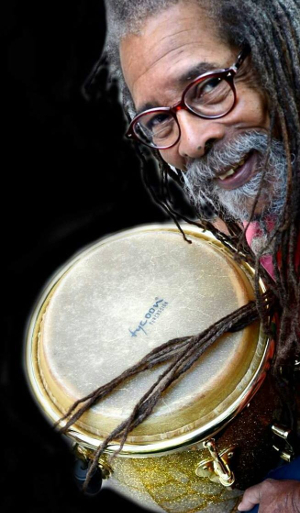 Well, now they have the Edna Manley music school. And, I feel kind of cool because one of the graduates of the school – he's now playing with Chronixx. "Hector." And he got an endorsement from the same drum company that I endorse, "Tycoon." And he said, "you should call me." Because I was in New York. And I called and he came down to see me. And he was talking about these tunes. And this particular tune he mentioned that he couldn't quite understand how the percussionist laid the stuff. But what tripped him, was that the tune was the original, "Cherry Oh Baby," by Eric Donaldson. So, we are talking about it. But maybe a half an hour later by the time we got in the house, I realized that he didn't know it was me that played it. (Laughing) He was just talking about the impression that it made on him, you know? I said, wow, man. Somebody is listening. I can go now. (Laughing)
Well, now they have the Edna Manley music school. And, I feel kind of cool because one of the graduates of the school – he's now playing with Chronixx. "Hector." And he got an endorsement from the same drum company that I endorse, "Tycoon." And he said, "you should call me." Because I was in New York. And I called and he came down to see me. And he was talking about these tunes. And this particular tune he mentioned that he couldn't quite understand how the percussionist laid the stuff. But what tripped him, was that the tune was the original, "Cherry Oh Baby," by Eric Donaldson. So, we are talking about it. But maybe a half an hour later by the time we got in the house, I realized that he didn't know it was me that played it. (Laughing) He was just talking about the impression that it made on him, you know? I said, wow, man. Somebody is listening. I can go now. (Laughing)
Sweet. But what would you recommend? There is school-learning and there's self-teaching. And I don't know if anybody else could do it like you did.
I did it like that because I had no alternative. There was no Edna Manley. And there was nobody "teaching." I didn't want to play the indigenous drums. I wanted to play fucking congas. That was what I wanted to play. It's either my blessing or my downfall.
I think it was everybody's blessing.
That's what I wanted to play. It was the conga shit. Everything else had to come with that.
I know that you played on Bunny Wailer's "Blackheart Man," and then you played on Peter Tosh's "Bush Doctor."
Uh-huh.
And because you have that experience which no one else has, I feel like you're the best person to ask this question: Roger Steffens, who writes about reggae a lot –
Yeah. He's my friend.
I recently interviewed Roger. And one of the things he said was that he was so upset with Chris Blackwell. Because he felt like Chris Blackwell had broken up The Wailers. But, at the same time he said that, in the end, he thought it may have been better for the music. Because it gave us three times the music. Because these men [Bob, Peter, and Bunny] each went on to have their respective solo careers. You were there. And you saw them.
Yeah.
Do you agree? Was it better for the music that the original Wailers broke up? Or, would it have been better if they had stayed together?
I frankly wonder. I wonder how immense a body of music they could have produced if they'd stayed together. And Chris' thing is that he didn't break up The Wailers. He could have prevented it. But he didn't.
Why do you say that?
I think it's easier in a situation like that to deal with one person. You know? They always try to separate the leader from the group. Because it's easier to deal with one person.
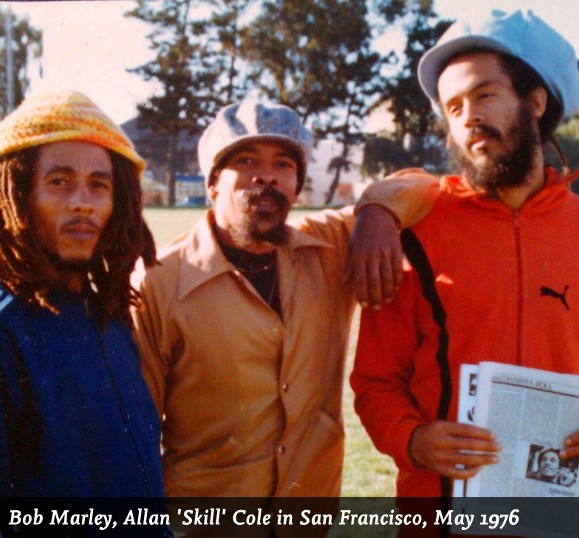
Are there any particular memories of Bob Marley or Peter Tosh that stick out in your memory?
Well, I remember, like... I remember roller skating in Golden Gate Park with Peter. And, with Bob... See, with Bob, every time Bob ran into me he'd always say, "you and me going to do something, just wait. You and me gonna do something." So now, if anybody says that to me, I say, "don't tell me that, because you're going to die." (Laughing)
Oh man.
(Laughing) Don't tell me "you are gonna do" something with me. Because someone I know used to say that. And they're gone.
Oh man. Wow.
Yeah. But I want to mention here Wire Lindo, Bob's keyboard player.
He passed recently?
He passed recently. My good friend. And the first tour I went on with Taj Mahal, we went East. And when we got to New York, he said, "you've got to go to Jamaica to get Wire." Ok. I wasn't going to argue because it was a trip to Jamaica. (Laughing) I was gonna go! (Laughing) You know? Ok. And so he got me the ticket. And, I didn't feel like I could just go and take this man's keyboard player. So I went up to the house. Which is now the [Bob Marley] museum. And sat up on the veranda. We're talking and smoking. I say, "I come for Wire." [And Bob] said, "What!?" I said, "Yeah, uh, Taj Mahal send me for Wire." And [Bob] said, "Ah, cool. Taj is mi uncle." (Laughing) I did not know at this point that [Bob] had met Taj, stayed at Taj's house when Taj was mixing "Slave Driver" and "Johnny Too Bad" on the "More Roots" album. And him and Family Man – Family Man played keyboards on Slave Driver on that album – and I didn't know until I came back that all this stuff went down. I didn't know that Taj knew Bob. I just thought that he had some arrangement with Wire. (Laughing) And I couldn't just go take the man's keyboard player like that! You know what I'm saying!? He knows me! (Laughing) It's not like some guy I didn't give a shit about. (Laughing)
Did you just laugh when you found all that out?
Yeah. I said, cool. But then, I missed the plane. 'Cause somehow I didn't make it. And when I looked in my pocket, I saw this ticket that somebody had given me to the Frazier-Foreman fight. (Laughing)
What!? Wow!
You know? And I don't know how come I missed the plane!? (Laughing hard)
Comments actually desactivated due to too much spams
Browse by categories
Recommended Articles
Latest articles
Recently addedView all
© 2007-2026 United Reggae. All Rights Reserved. Reproduction in whole or in part is prohibited. Read about copyright
Terms of use | About us | Contact us | Authors | Newsletter | A-Z














